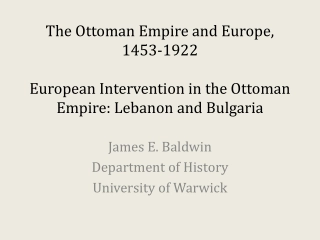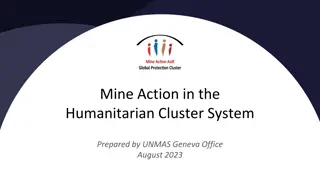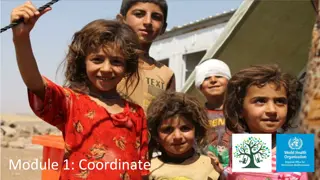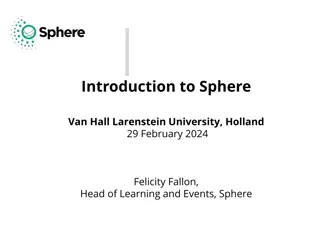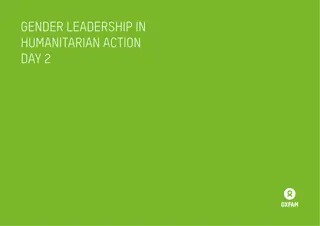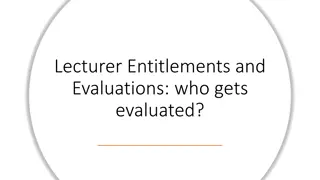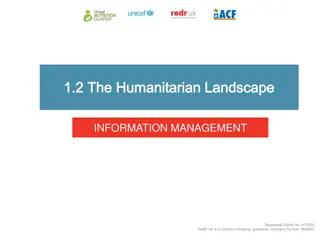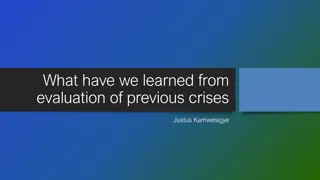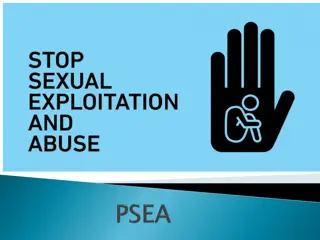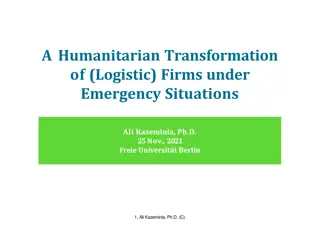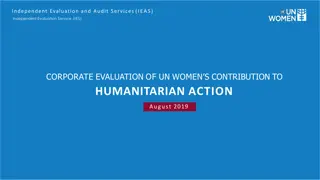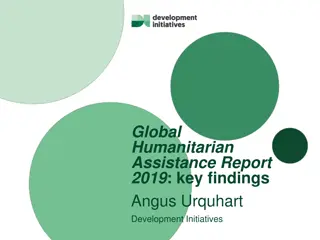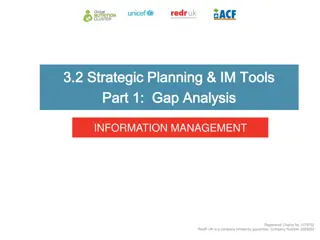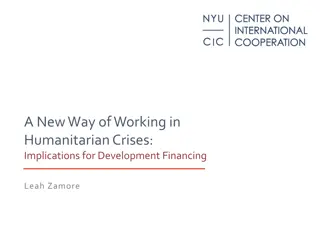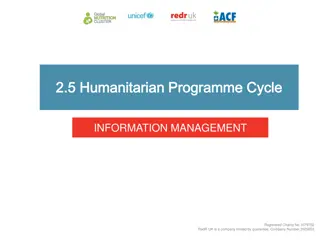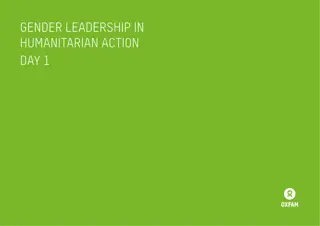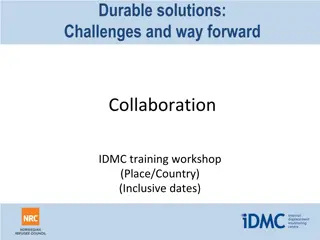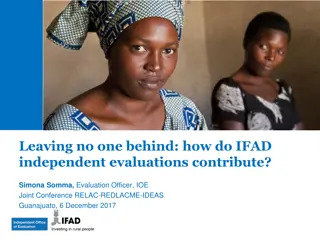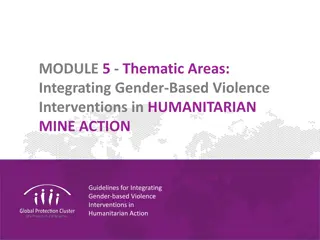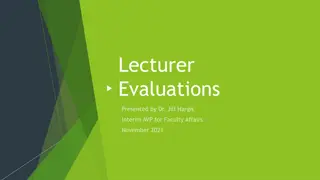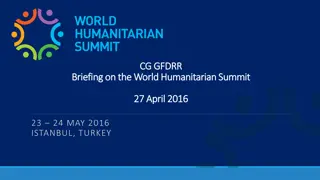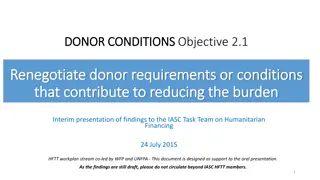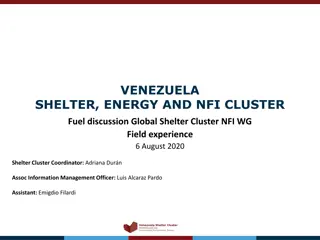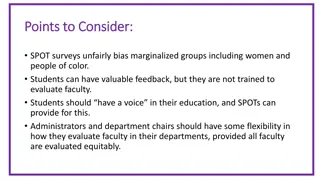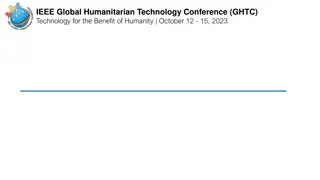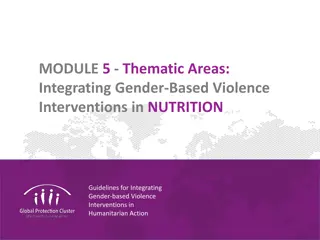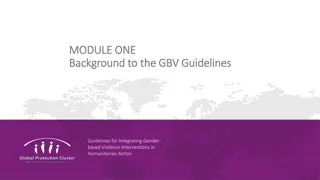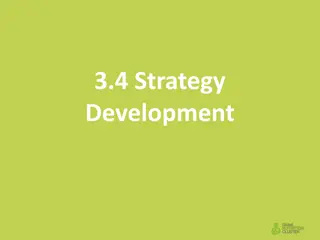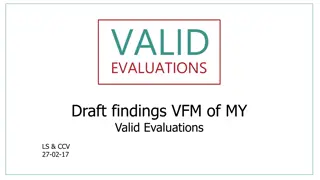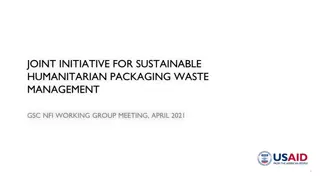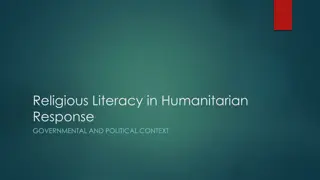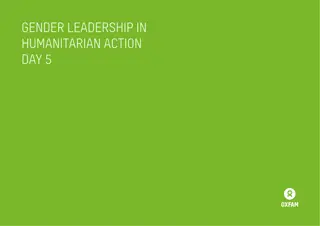European Humanitarian Intervention in the Ottoman Empire
Explore European powers' moral duty to intervene in Ottoman affairs during the 19th century, motivated by humanitarian and imperial interests. Discover the impact of the Concert of Europe and legal theories on humanitarian intervention.
3 views • 22 slides
Promising Practices for Faculty Evaluations in DEIA - ASCCC Spring 2023 Plenary
Explore promising practices for faculty evaluations focusing on Diversity, Equity, Inclusion, and Anti-Racism (DEIA) in the ASCCC Spring 2023 Plenary. Learn about Title 5 regulations, initiatives for systemic change, and creating a community of belonging through inclusive evaluations. Presenters inc
1 views • 15 slides
Mine Action in the Humanitarian Cluster System
The Inter-Agency Standing Committee (IASC) plays a crucial role in coordinating humanitarian efforts, with a focus on mine action in the global protection cluster. This involves clear responsibilities, strategic planning, and advocacy to address humanitarian needs. The IASC Reference Module for Clus
3 views • 18 slides
Comprehensive Guide to Assessing and Prioritizing Child and Adolescent Health in Humanitarian Settings
This module provides a detailed operational guide on assessing and prioritizing child and adolescent health in humanitarian settings. It covers obtaining data on child/adolescent health, coordinating responses, planning activities, and utilizing data systems for monitoring and evaluation. Key compon
7 views • 31 slides
Humanitarian Action and Coordination: Essential Guidelines and Standards
This comprehensive guide provides insights on coordinating child and adolescent health in humanitarian settings, emphasizing the importance of understanding and implementing key actions. It covers the utilization of resources like the operational guide, self-assessment tracker, and core humanitarian
2 views • 43 slides
Understanding Sphere: Humanitarian Standards and Practices
Learn about Sphere, a global movement focusing on humanitarian standards and quality assistance. Explore the Sphere Handbook, its philosophy, and the importance of humanitarian standards. Discover the key areas covered in the Handbook and why they are essential for effective crisis response. Join a
10 views • 31 slides
Gender-Responsive Humanitarian Leadership and Transformation
Challenges in implementing gender-responsive humanitarian programmes require greater political will, leadership, resources, accountability, and capacity building. Feminist leadership aims to transform power dynamics, fight inequality, and create inclusive structures. It involves principles, values,
6 views • 14 slides
Guidelines for Lecturer Evaluations and Entitlements at CPP
This document outlines the evaluation process for lecturers at CPP, including annual and cumulative evaluations, who needs to be evaluated, the importance of cumulative evaluations, and the time periods covered by evaluations. It explains the criteria for evaluations, ensuring fair assessment and pr
1 views • 10 slides
Understanding Humanitarian Landscape and Coordination Challenges
The humanitarian landscape involves various organizations working together to provide assistance during crises. Coordination challenges, such as identifying needs, existing assistance, and government involvement, have been prevalent. The Inter-Agency Standing Committee (IASC) was established in 1991
1 views • 21 slides
Insights from Evaluation of Previous Humanitarian Crises and Core Humanitarian Standards
Evaluation of past crises reveals the importance of core humanitarian standards in providing timely, coordinated, and effective assistance. Learning from experience, feedback mechanisms, and competent staff are key for addressing humanitarian crises. Data and systems play a crucial role in monitorin
0 views • 13 slides
Inter-Cluster Coordination and Information Management in Humanitarian Emergencies
Inter-Cluster Coordination and Information Management play vital roles in humanitarian emergencies. The coordination mechanism involves regular meetings convened by the RC/HC and coordinated by OCHA, providing opportunities for clusters to collaborate on shared planning, needs assessments, and poole
2 views • 13 slides
Understanding PSEA: Prevention and Response to Sexual Exploitation and Abuse in Humanitarian Settings
Sexual exploitation and abuse in humanitarian settings pose serious threats to vulnerable populations, directly contradicting humanitarian principles. The establishment of initiatives like the Iraq PSEA Network aims to prevent and respond to such misconduct through awareness-raising, capacity buildi
0 views • 14 slides
Humanitarian Transformation of Logistic Firms in Emergency Situations
This research explores how logistic firms evolve into humanitarian entities in response to grand challenges like natural disasters and refugee crises. Case studies and data collection methodologies are utilized to understand the transformation process, as seen in examples such as SOS Mediterrane and
0 views • 8 slides
Corporate Evaluation of UN Women's Contribution to Humanitarian Action
The Independent Evaluation and Audit Services conducted an evaluation of UN Women's work in humanitarian action from 2014-2018, assessing its relevance, effectiveness, and sustainability. The evaluation emphasized the need for stronger links between UN Women's global normative work and humanitarian
0 views • 9 slides
Global Humanitarian Assistance Report 2019 Key Findings
The Global Humanitarian Assistance Report 2019 explores key findings regarding international humanitarian assistance, multi-year funding growth, funding to UN agencies, cash and voucher programs, and direct funding to local and national actors. The report highlights the challenges and disparities in
4 views • 11 slides
Humanitarian Response Planning and Implementation Tools
This content discusses various tools and guidelines used in the strategic planning and implementation stages of humanitarian response operations. It covers gap analysis, flash appeals, gender considerations, humanitarian response plans, secondary data analysis, and GNC IM tools for informing strateg
1 views • 18 slides
Innovative Approaches in Humanitarian Crises and Development Financing
This study explores the New Way of Working in humanitarian crises, focusing on reinforcing national systems, anticipating crises, and transcending humanitarian-development divides. Promising trends include rising government ownership and increased linkages between humanitarian activities and governm
0 views • 6 slides
Understanding the Humanitarian Programme Cycle (HPC)
The Humanitarian Programme Cycle (HPC) is a coordinated series of actions aimed at preparing for, managing, and delivering humanitarian responses efficiently. It focuses on delivering fast, coordinated, effective, and protection-driven aid to those affected by crises. Central to the HPC is the invol
2 views • 8 slides
Promoting Gender Equality in Humanitarian Action
Understand the importance of promoting gender equality in humanitarian action, including principles, challenges, and the need to transform attitudes and beliefs. Learn key global standards, gender analysis, and leadership in humanitarian settings. Explore the rights of women and girls, gender inequa
1 views • 15 slides
Collaboration for Durable Solutions in Humanitarian Settings
This workshop addresses challenges and opportunities in achieving durable solutions for refugees and internally displaced persons. It emphasizes the importance of collaboration among various stakeholders, including humanitarian and development actors, to ensure long-term recovery and sustainable pea
0 views • 21 slides
Enhancing Inclusivity: IFAD Independent Evaluations for Better Targeting
IFAD independent evaluations play a crucial role in ensuring that vulnerable groups are not left behind in rural development initiatives. By assessing the effectiveness of targeting methods, documenting instances where vulnerable groups are excluded, and providing recommendations for improvement, th
0 views • 8 slides
Guidelines for Integrating Gender-Based Violence Interventions in Humanitarian Action
This module focuses on integrating gender-based violence interventions into humanitarian mine action, providing guidelines, agenda, outcomes, and strategies for implementation. It emphasizes informing and supporting humanitarian actors to develop action plans and accountability measures to address g
0 views • 56 slides
Performance Evaluation Workshop 2022 for Civil Service & Academic Positions
This workshop outlines the Performance Evaluation Cycle for the year 2022, detailing the evaluation period, form submission deadlines, and the shift towards digital evaluations. It emphasizes the importance of constructive feedback in evaluations and provides insights into the purpose of evaluations
0 views • 34 slides
Faculty Evaluations: Periods, Deadlines & Procedures
Annual and cumulative evaluations for temporary and tenured faculty are essential in the academic setting. Annual evaluations cover the past year's teaching activities while cumulative evaluations consider a longer timeframe. Deadlines and review processes are detailed in the evaluation calendar for
0 views • 12 slides
Lecturer Evaluations and Policies at Cal Poly Pomona
Annual and cumulative evaluations are conducted for lecturers at Cal Poly Pomona to review their performance over specific periods. Policy 1336 outlines the criteria for evaluations, including timelines and requirements for different categories of lecturers. The evaluations cover teaching activities
0 views • 13 slides
Insights from the World Humanitarian Summit Briefing
The World Humanitarian Summit, held in Istanbul, Turkey, saw significant participation and contributions. Key topics included consultations, core responsibilities, roundtable discussions, and commitments to address global challenges such as forced displacement, gender equality, and climate change. T
0 views • 15 slides
Renegotiation of Donor Conditions for Humanitarian Financing
This interim presentation outlines the objective of renegotiating donor requirements to reduce burden in humanitarian financing. Findings focus on the severity of conditions, methodology used, respondents involved, general findings, and top conditions affecting humanitarian principles. The document
0 views • 12 slides
Humanitarian Efforts in Addressing Shelter, Energy, and NFI Needs in Venezuela
Humanitarian organizations in Venezuela are working to address the critical needs for shelter, energy, and non-food items in the country. Initiatives such as alternative energy sources for cooking have been implemented to improve access to electricity and essential supplies. Challenges including lim
0 views • 13 slides
Addressing Bias in Student Evaluations of Faculty: Considerations and Resolutions
SPOT surveys can unfairly bias marginalized groups in academia, such as women and people of color, impacting faculty evaluations. While student feedback is valuable, students may not be equipped to assess teaching effectively. Institutions should use SPOT data for reflection rather than consequentia
0 views • 4 slides
The Manfred Lachs International Conference on Conflicts in Space and the Rule of Law
The 4th Manfred Lachs International Conference held in Montreal in 2016 explored the intersection of conflicts in space and the rule of law, specifically focusing on the legal framework surrounding outer space weaponry. Discussions highlighted the importance of upholding humanitarian values, promoti
0 views • 7 slides
IEEE Global Humanitarian Technology Conference (GHTC) 2023
Explore the latest in humanitarian technology at the IEEE Global Humanitarian Technology Conference (GHTC) 2023. Join experts in discussing data-centric operations design for biomedical screening technologies and promoting healthcare delivery. This event aims to leverage technology for the benefit o
0 views • 7 slides
Integrating Gender-Based Violence Interventions in Humanitarian Nutrition Programs
This module focuses on integrating gender-based violence interventions in humanitarian nutrition guidelines. It covers key areas such as linking GBV and humanitarian programming, implementing guidance, assessment, resource mobilization, and developing action plans. The aim is to inform nutrition act
0 views • 56 slides
Enhancing Gender-based Violence Interventions in Humanitarian Action
The guidelines focus on integrating gender-based violence interventions into humanitarian action, emphasizing key changes and additions such as structural modifications, contextual considerations, and enhanced accountability. Led by UNICEF and UNFPA, the revision process involved extensive consultat
0 views • 21 slides
Understanding Humanitarian Response Plans and Flash Appeals
This content explores the features and functions of Flash Appeals and Humanitarian Response Plans (HRP) in crisis management. It delves into the role of clusters in developing these plans, the processes involved in responding to sudden or protracted crises, and the significance of coordination and s
1 views • 17 slides
Impact of Multi-Year Funding on Humanitarian Evaluations in Multiple Countries
A study spanning 3.5 years across Ethiopia, DR Congo, Sudan, and Pakistan evaluates the effectiveness of Multi-Year (MY) funding in building resilience, enabling early action, and enhancing value for money (VFM) in humanitarian projects. Findings suggest that while MY funding facilitates operational
0 views • 8 slides
Joint Initiative for Sustainable Humanitarian Packaging Waste Management Meeting Summary
Collaborative effort of 16 partners in the Joint Initiative for Sustainable Humanitarian Packaging Waste Management, highlighting key steps taken from 2019 to April 2021. The initiative aims to achieve sustainable changes, coordinate efforts, reduce packaging waste, and engage in technical stakehold
0 views • 12 slides
Challenges of Religious Literacy in Humanitarian Response within Governmental and Political Context
Challenges arise in humanitarian response within governmental and political contexts due to secular approaches in religious societies. Issues include discriminatory practices against local faith-based organizations (FBOs), unhelpful gender dynamics, harmful social practices, and simplistic charity m
0 views • 6 slides
Understanding Settlement Agreements in Special Education Cases
Delve into the complexities of settlement agreements in special education cases through the lens of the South Kingstown v. Joanna S. case in the First Circuit Court. The case revolves around disputes over independent educational evaluations, occupational therapy evaluations, and psychoeducational ev
0 views • 27 slides
Gender Equality Practices in Humanitarian Aid Organizations
Internal organizational practices play a crucial role in ensuring gender equality in organizations delivering humanitarian aid. This includes resource allocation, policies, accountability, and staff training. Oxfam's Minimum Standards outline key practices for promoting gender equality. Accountabili
0 views • 10 slides
James Nachtwey: A Pioneer in Humanitarian Photography
James Nachtwey, a renowned photographer, started his career capturing civil unrest in Northern Ireland. His impactful work with NGOs like the International Committee of the Red Cross has led to significant humanitarian efforts, saving millions of lives. Despite debates on exploitation, Nachtwey's im
0 views • 9 slides
